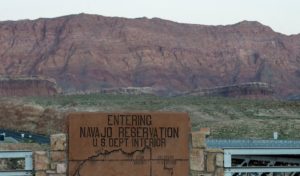
Promoting business development and economic independence on reservations is crucial to sustaining tribal communities.
In April 2020, the national unemployment rate skyrocketed due to the COVID-19 pandemic. Data show that the pandemic affected Native workers particularly harshly, with over 26 percent of the Native American workforce unemployed last April compared to 14.5 percent of the national population.
The disparity between the Native and non-Native unemployment rates existed before the pandemic. On some Indian reservations in the United States, the unemployment rate among residents has ranged from 20 percent to 80 percent—demonstrating the continuous need for government efforts to promote functioning economies among Native communities.
Few of the 300 Indian reservations in the United States have functioning economies in which reservation residents can be employed, spend their money, and find adequate housing. As a result, almost all reservation residents have to travel to distant cities to find banks, businesses, higher education, and jobs. This situation helps state economies but serves to impoverish reservations, where Native people disproportionately live in poverty.
In light of these conditions, tribal governments and communities should increase the number of privately and tribally owned small businesses on reservations to help create functioning economies in Indian country.
Governments play a crucial role in developing a private, free market economic system by protecting the public interest, ensuring fair competition, and managing the legal systems that help enforce contracts and property rights. Governments can also regulate, creating and enforcing rules that ensure a fair, stable economic system which, in turn, can attract investors.
By adopting commercial laws, and by creating stable and fair court systems and bureaucracies, tribal governments can encourage the development of private businesses on reservations. Tribes can also use taxation and regulatory strategies to attract private investment and new businesses to reservations. Tribal governments must play this important role for reservation economies.
In addition to encouraging private business development, supporting Indian industry and labor is a common-sense idea that promotes tribal self-preservation, because it keeps “Indian money” in the Indian community and helps to grow tribal economies.
Tribes can support existing Native businesses by enacting and strengthening “Buy Indian” laws. The U.S. Congress, for example, enacted the 1910 Buy Indian Act which sought to promote Indian industry whenever practicable. The Act provides the Secretary of the U.S. Department of Interior with considerable discretion when it comes to spending federal funds on Indian labor and Indian-made products.
But tribal policymakers could consider lobbying Congress for stronger federal Buy Indian legislation. For example, Congress could require the Secretary of the Interior to spend a certain amount of the Bureau of Indian Affairs’ budget on Indian labor and products. Doing so would create an enormous incentive for tribal businesses to provide these goods and services, which would assist in creating many more Indian-owned and reservation-based businesses.
Tribal governments, too, should enact their own Buy Indian legislation and should purchase as many goods and services as possible from tribal, reservation-based, and Indian-owned businesses. In 1985, the Navajo Nation enacted such a law, called the Navajo Nation Business Opportunity Act. The law provides that the Navajo Nation will grant Indian-owned businesses the first opportunity to contract with the Nation. The tribal government enacted this legislation in part because 76 percent of contracts awarded by the Navajo Nation went to non-Navajo people and companies.
In addition to providing a preference to Indian businesses when distributing government contracts, tribal governments could also mandate the expenditure of a certain percentage of annual tribal revenues on private businesses owned by tribal citizens or other Indians. These kinds of statutory mandates and actions could go a long way toward encouraging and supporting the creation, operation, and expansion of more privately owned businesses on reservations.
Tribal governments can also support the development of Indian-owned businesses by creating an environment that assists reservation residents who want to start businesses. Although many privately owned businesses in the United States are started using family savings and bank loans, most American Indians lack access to these resources due to historic poverty and high unemployment rates. Consequently, seed money that tribal, private, state, and federal loans provide is crucial to alleviating this funding problem.
Furthermore, reservations rarely have role models of successful business owners from which others can learn. They are often lacking on-reservation businesses where young people can get their first jobs and become familiar with business management. Tribal economic development departments can help address this situation through mentoring and training programs for young entrepreneurs.
A few organizations already provide this kind of training. For example, in 1992, four tribes created the Oregon Native American Business and Entrepreneurial Network to train individual Indians on how to draft business plans, acquire financing, and operate their own business. Similarly, in 2000, individuals on the Cheyenne River Sioux Indian Reservation created the Four Bands Community Fund, a Native community development financial institution that focuses on entrepreneurship and financial literacy.
Another example is Lakota Funds, the first Native community development financial institution that community leaders on the Pine Ridge Reservation created in 1986. Lakota Funds has assisted economic development on that reservation, disbursing over $10 million in loans since it was established. These loans helped to create over 1,600 jobs and to establish and expand nearly 600 businesses on or near the reservation.
Despite the importance of these initiatives, tribal governments also need to provide the laws, regulations, and independent court systems that will assist and protect business and property rights. Indian nations must make reservations fair and reasonable locations for businesses if they expect to attract private investment and build their economies.
By prioritizing economic development—including the creation of their own businesses and other efforts to attract private development to provide a wide variety of goods and services on reservations—tribal governments can dramatically improve economic conditions on reservations and better sustain tribal communities.
American Indian governments must do everything they can to develop the entrepreneurial spirit in reservation residents and to ensure that more businesses are located in Indian country. Functioning economies allow Indian families to acquire living wage jobs, adequate housing, and the necessary infrastructure to live their lives on their own reservations.
This essay is part of a series entitled Native Peoples, Tribal Sovereignty, and Regulation.




